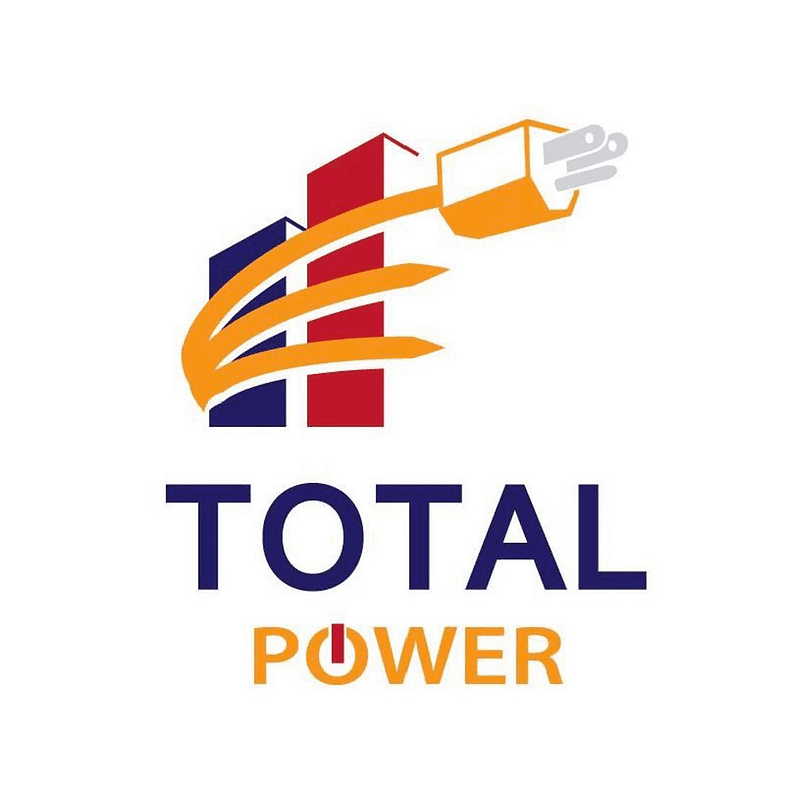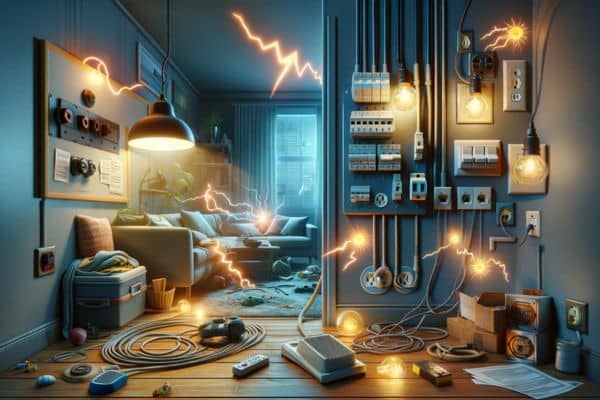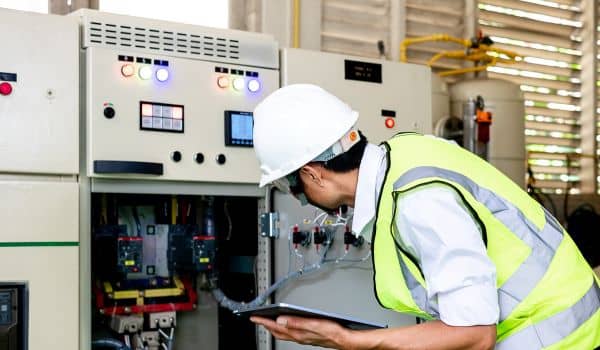How Often Should You Have an Electrical Inspection?
Written by Total Power Energy Team
Published:
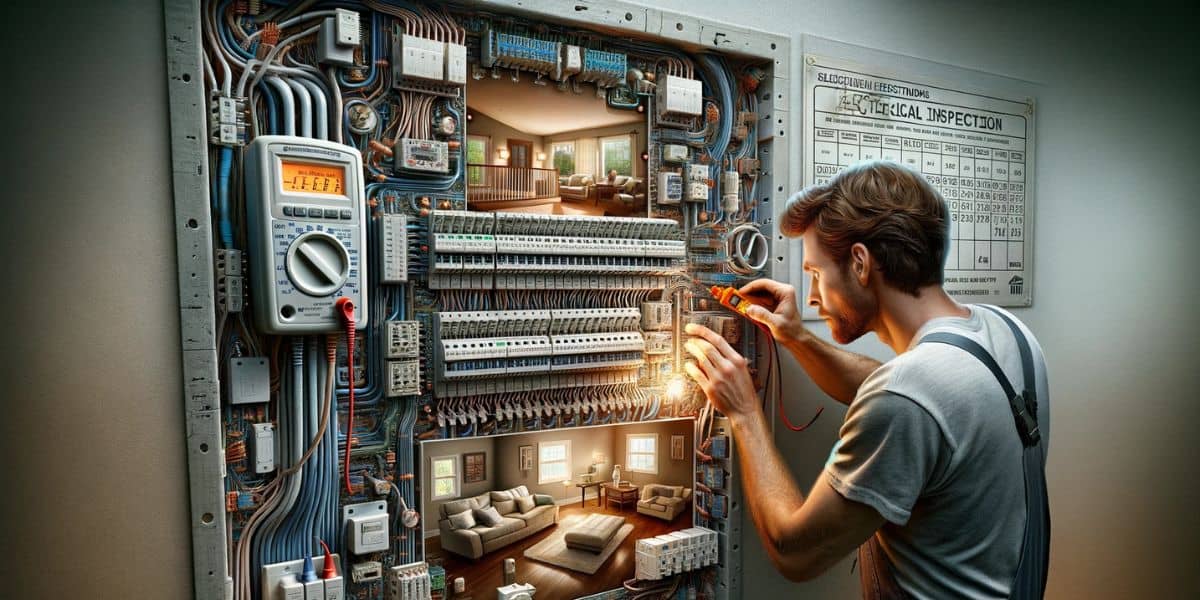
did you know electrical problems cause an average of 51,000 house fires each year?” These fires caused around $1.5 billion in property damage.
As a homeowner, ensuring your electrical system is safe and working well is crucial. How often should you have an electrical inspection?
Many homeowners and property managers often ask this question. This complete guide will cover all the essential details about home electrical inspections. Learn about:
- The importance of regular inspections
- How often you should get an inspection
- Common signs that your home needs an inspection
- What to expect during an inspection
- How to choose a qualified electrician
The Basics of Electrical Inspections
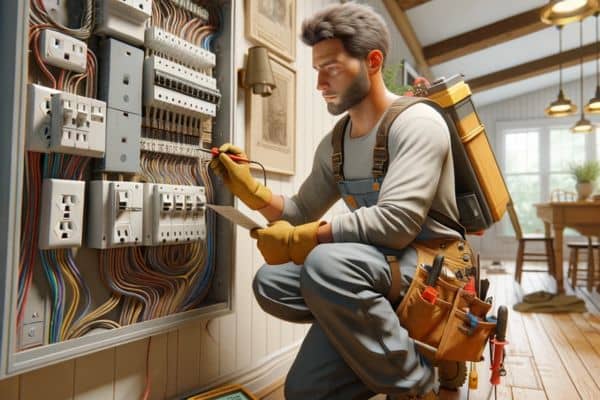
An electrical safety inspection thoroughly examines your property’s electrical system, wiring, and components.
This process is designed to identify potential hazards, ensure compliance with safety standards, and prevent unforeseen electrical problems.
How often should an electrical inspection be performed
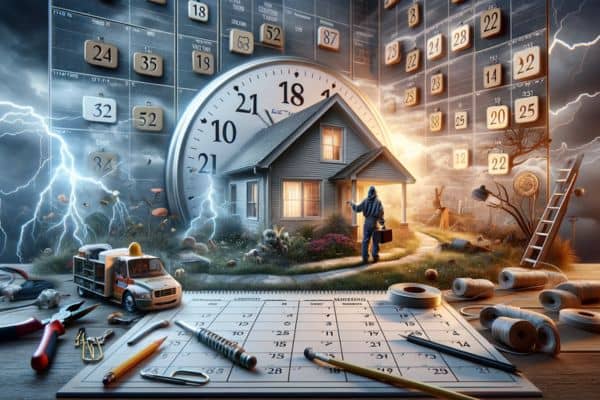
The frequency relies on various factors
- The age of your home: Older homes may need more frequent inspections than newer homes.
- The condition of your Energy supply system: If your home has a history of Electrical hazards, you may need more frequent inspections.
- The type of electrical work you have done: If you have recently had major electrical work done, such as adding new circuits or appliances, you will need an inspection to ensure the work was done safely and correctly.
Regular electrical safety inspections, conducted every three to five years, are essential for keeping your home safe.
These proactive checks help spot potential problems early on, preventing them from becoming serious and ensuring your home stays secure.
Common Signs That Your Property Needs an Electrical Inspection
How do you know when it’s time for an Electrical safety assessment? Watch for these common signs that show your place might need an expert’s help.
#1 Flickering Lights
Persistent flickering lights may be a sign of an underlying electrical issue.
If you notice consistent flickering, it’s time to schedule an electrical inspection to identify and address the root cause.
#2 Tripping Breakers or Blown Fuses
Frequent tripping of circuit breakers or blown fuses clearly indicates electric problems.
While occasional tripping is normal, frequent occurrences warrant a closer look to prevent potential hazards.
#3 Burning Smells
If you detect any burning smells, especially near electrical outlets or panels, it’s crucial to act promptly.
Unusual odors can indicate overheating or faulty wiring, posing a serious fire risk.
#4 Buzzing or Sizzling Sounds
Strange sounds, such as buzzing or sizzling, can suggest electrical issues.
These noises may indicate loose connections, faulty wiring, or other potential hazards that require professional electrician attention.
#5 Warm or Discolored Outlets and Switches
Outlets or switches that feel warm to the touch or display discoloration could indicate Safety risks.
These issues need immediate inspection to prevent further damage.
#6 Inconsistent Power Outlets
Inconsistencies in power supply to outlets may indicate wiring problems.
Addressing these issues promptly ensures a consistent and safe power supply throughout your home.
#7 Electrical Shocks
Experiencing electrical shocks when using switches or sockets is a clear warning sign.
Don’t ignore this; seek professional assistance to identify and rectify the problem.
#8 Old or Outdated Wiring
In older homes, outdated electrical wires can pose significant risks.
If your property has not undergone an electrical safety inspection in the last few years, it’s advisable to schedule one to assess the condition of the wire.
#9 Frequent Appliance Malfunctions
Your appliances ‘ frequent malfunctions or erratic behavior could result from underlying electrical issues.
An inspection can pinpoint the cause and prevent further damage.
Cost of Electrical Inspections
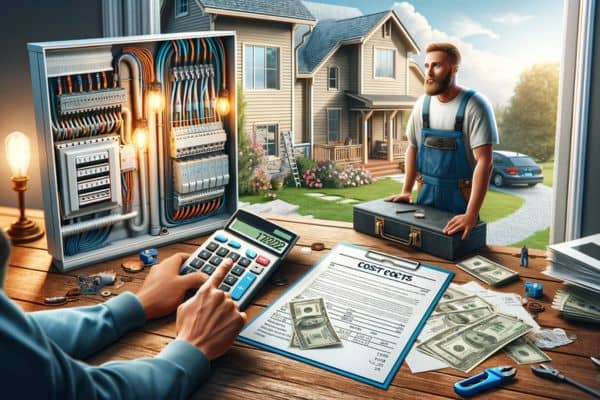
While the exact cost may vary based on several factors, including the size of your property and the complexity of the Electrical infrastructure, the benefits far outweigh the investment.
On average, householders can expect to pay between $200 and $500 for a comprehensive inspection.
Factors Influencing Inspection Costs

- Property Size: Larger properties often mean more electrical components to inspect, influencing the cost.
- How Complicated Your Wiring Is: If your wire is tricky or super advanced, it might take more time and skill, making the inspection cost more.
- How Old Your Place Is: Older buildings need more attention because their electrical systems could be outdated, making the inspection a bit pricier.
- Accessibility: Easy access to Circuit Breakers makes inspections more efficient, potentially reducing costs.
- Location: Different places have different prices for labor and materials so that location can affect the total cost.
- Location: If you need the inspection right away, it might cost a bit more for a speedy service.
Benefits of Regular Electrical Inspections
Regular inspections contribute to the overall safety of your property. Let’s explore these advantages in more detail:
Prevention of Electrical Accidents
Regular inspections play a pivotal role in preventing electrical accidents.
Identifying and rectifying potential hazards significantly reduces the risk of fires, shocks, and other safety concerns.
Identifies Potential Hazards Early
Early detection of potential hazards is a key advantage of routine inspections.
Addressing issues before they escalate ensures a safe and reliable Electrical infrastructure.
Avoids Costly Repairs
Identifying and resolving electric issues early can save you money in the long run.
Early detection prevents minor problems from turning into major, more expensive issues that may require extensive repairs.
Increased Efficiency
An efficiently functioning Power distribution system contributes to the overall efficiency of your home.
Regular inspections ensure that your system operates optimally, providing a seamless power supply when you need it.
Long-Term Cost Savings
While the upfront cost of an inspection may seem like an expense, viewing it as an investment is essential.
The long-term cost savings from preventative measures far outweigh the potential fees associated with neglecting electrical issues.
Provides Peace of Mind for Occupants
Perhaps the most valuable benefit is the peace of mind of knowing your home is electrically secure.
For householders and property managers alike, this assurance is invaluable.
DIY Electrical Testing vs. Professional Inspections

Risks and Limitations of DIY Testing
While some homeowners may be tempted to perform DIY electrical testing, this approach comes with significant risks.
Without the expertise of a qualified electrician, there is a higher chance of overlooking potential hazards or misinterpreting the results.
What Happens During an Electrical Home Inspection?
During an electrical home inspection, a skilled electrical contractor checks your home’s electrical system for safety and functionality.
Here’s what happens:
- Visual Inspection: The electrician examines visible components like outlets, switches, and electrical panels to identify any visible issues.
- Wiring Check: They look at the wiring to ensure it’s not damaged or outdated.
- Inspect the Panel: The electrician thoroughly checks the electrical panel to ensure it’s safe and not overloaded.
- Test the Outlets: Every outlet gets tested to ensure it works correctly and won’t cause shocks or fires.
- Check Appliances: Appliances are inspected to ensure they’re set up correctly and won’t Excessively load the system.
- Look at Extension Cords: The inspector checks how extension cords are used to make sure they’re safe.
- Overload Assessment: The electrician assesses the overall load on the electrical system, ensuring it can handle the demand without being Excessively loaded.
- Safety Checks: The inspector looks for safety hazards, such as exposed wiring, and ensures compliance with safety regulations.
- Documentation: The findings are documented, and recommendations for necessary repairs or upgrades are provided in a detailed report.
How to Choose a Qualified Electrician
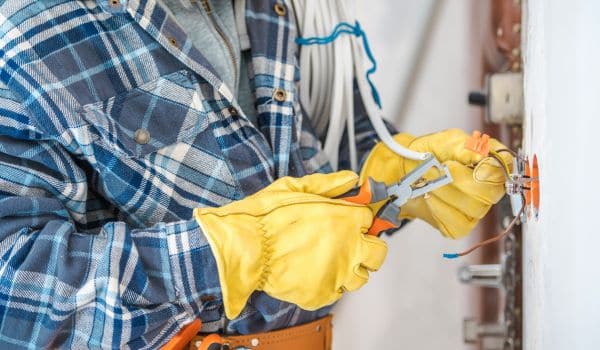
This ensures they have the necessary expertise to assess your Energy supply system thoroughly.
Experience and Track Record: Look for an electrician with a proven track record and extensive experience in residential Routine electrical maintenance.
Experience speaks volumes when it comes to identifying and addressing potential issues.
Reviews and Recommendations: Customer reviews and recommendations provide valuable insights into the electrician’s reliability and professionalism.
Take the time to research and choose an electrician with positive feedback from previous clients.
Bottom line
The question of how often you should get an electrical inspection deserves careful consideration.
Regular electrical inspections are essential for maintaining the safety and functionality of the property.
By understanding the frequency, signs, costs, and benefits of these inspections, you can make informed decisions to safeguard your home or commercial space.
Frequently Asked Questions
Ensuring Electrical Safety: What Gets Checked?
During electrical inspections, professionals check for potential hazards like faulty wiring, overloaded circuits, and outdated components.
They make sure your Electrical infrastructure follows safety standards.
How Often to Check Electrical Wires?
Electrical wires should undergo routine checks as part of an inspection every 3 to 5 years.
If you notice signs like flickering lights or burning smells, get an inspection done promptly.
How Often for Visual Inspection?
While homeowners can do visual checks, a thorough, professional inspection is recommended every 3 to five years.
Professionals go beyond visuals, examining internal components for a more in-depth assessment.
Frequency of Electrical Maintenance
Routine electrical maintenance, which includes inspections, is generally advised every three to five years.
This regular schedule helps catch and fix potential issues early, ensuring your Energy supply system stays safe and efficient.
Total Power energy content Team
Total Power Energy content team provide valuable tips and guidance on electrical information.
Our writers are experienced in the electrical field and produce high-quality content such as electrical safety, installation, repair, etc.
Our goal? To help you work safely and smartly. Our advice is easy to follow whether you’re at home or on the job. Stay safe and confident with our help!
